最新外研版英语必修一Module1-Module3重点知识总结
外研版必修1 Module3重难点归纳

外研版高一英语必修一Module3 重难点归纳重点短语:是...的缩写________________________缺乏... ________________________在20 世纪90 年代________________________超过________________________more than + 名词:________________________ more than+ 形容词/ 副词:_________________过时的,不流行的________________________时尚的,流行的________________________以... 的速度________________________出席开幕式________________________一直,总是________________________把某物提供给某人________________________给某人提供某物________________________=________________________把某物提供给某人=________________________提供某人某物=________________________把某物给某人offer sb. sth. for... ________________________同意某人做某事________________________同意做某事________________________同意某人的意见________________________查阅,涉及到________________________被用来做某事________________________习惯于…________________________过去常常做________________________被用作…________________________重点句型And what a ride! 一次多么美妙的旅行啊!!感叹句的基本结构What 引导的感叹句:①What a/an + 形容词+ 名词(单数可数名词) + 主语+ 谓语!②What +形容词+ 名词(复数可数名词) + 主语+ 谓语!③What + 形容词+ 名词(不可数名词) + 主语+ 谓语!How 引导的感叹句:①How + 形容词/ 副词+ a/an 名词(单数可数名词) + 主语+ 谓语!②How + 形容词/ 副词+ 主语+ 谓语!③How + 主语+ 谓语! e.g.How dangerous the fish is! How lovely a boy he is! How time flies! 光阴似箭!感叹句专项练习1. Look at the smog. _______ bad weather it is!A. HowB. How aC. WhatD. What a2. ____________ great picture! Who painted it?A. HowB. WhatC. How aD. What a3. --- It’s reported that some famous singers will give a performance in Yangzhou.---Wow, ______________.A. how exciting newsB. what exciting newsC. what an excited newsD. how excited the news is4. ___________________great fun they are having in the sitting room!A. WhatB. HowC. What aD. How a5. ______________ great progress he has made this term! He feels _____________.A. What a, excitedB. What, excitedC. How, excitedD. How an, exciting6. —______________ hard work it is!—Yes, but he seems ________ to do it.A. What a, happyB. What, happyC. What a, happilyD. How, happy7. ____________ enjoyable sports news program on Channel 1!A. HowB. How anC. What anD. What8. -- _______ you’ve made! But you should still work harder.-- Thank you, I will.A .What a big mistake B. How big mistakes C. What great progress D. How great progress9. --_______ lovely dress! ---It ______________ by my sister.A. How; makesB. How a; madeC. What a; was madeD. What; is making10. —Mother’s Day is coming. Here is a pair of jeans for you, Mum.— ____________ beautiful blue jeans! Thank you, Amy.A. How aB. HowC. What aD. What语法要求:一:动词的过去分词作表语和定语二:一般过去时用法:基本用法在初中已经总结过,在此补充一些常与一般过去时连用的时间状语。
(完整版)外研版高中英语必修1重要知识点归纳
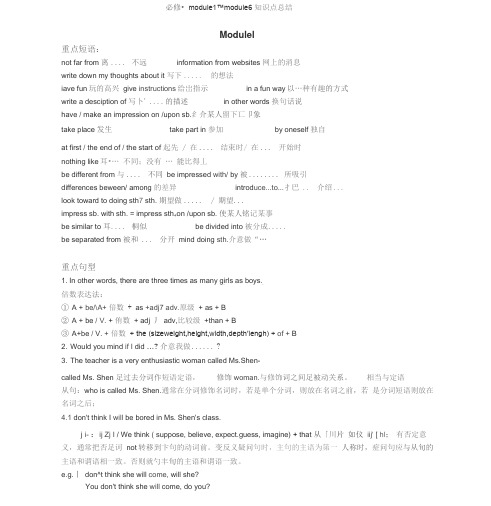
必修• module1™module6 知识点总结Modulel重点短语:not far from 离.... 不远information from websites 网上的消息write down my thoughts about it 写下..... 的想法iave fun玩的高兴give instructions给岀指示in a fun way以…种有趣的方式write a desciption of 写卜' .... 的描述in other words 换句话说have / make an impression on /upon sb.纟介某人留下匸卩象take place 发生take part in 参加by oneself 独自at first / the end of / the start of 起先/ 在.... 结束时/ 在... 开始时nothing like耳•… 不同;没有… 能比得丄be different from 与.... 不同be impressed with/ by 被........ 所吸引differences beween/ among 的差异introd uce...to...扌巴 .. 介绍...look toward to doing sth7 sth. 期望做..... / 期望...impress sb. with sth. = impress sth+on /upon sb. 使某人铭记某事be similar to 耳.... 桐似be divided into 被分成.....be separated from 被和 ... 分开mind doing sth.介意做“…重点句型1. In other words, there are three times as many girls as boys.f J - J倍数表达法:①A + be/\A+ 倍数+ as +adj7 adv.原级+ as + B②A + be / V. + 侑数+ adj 丿adv,比较级+than + B③A+be / V. + 倍数+ the (sizeweight,height,width,depth’lengh) + of + B2. Would you mind if I did …? 介意我做...... ?3. The teacher is a very enthusiastic woman called Ms.Shen-called Ms. Shen 足过去分词作短语定语,修饰woman.与修饰词之间足被动关系。
新教材-外研版高中英语必修第一册全册各单元知识点提炼汇总(单词短语句型语法等详解及扩展)
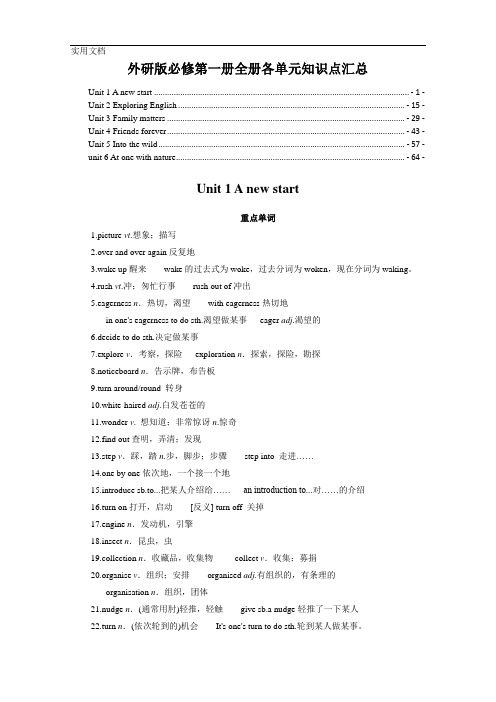
外研版必修第一册全册各单元知识点汇总Unit 1 A new start .................................................................................................................... - 1 -Unit 2 Exploring English ....................................................................................................... - 15 -Unit 3 Family matters ............................................................................................................ - 29 -Unit 4 Friends forever............................................................................................................ - 43 -Unit 5 Into the wild ................................................................................................................ - 57 -unit 6 At one with nature........................................................................................................ - 64 -Unit 1 A new start重点单词1.picture vt.想象;描写2.over and over again反复地3.wake up醒来wake的过去式为woke,过去分词为woken,现在分词为waking。
外研版高一必修一module1知识点

外研版高一必修一module1知识点外研版高一必修一Module 1 知识点Module 1 知识点概述:Module 1 是高中英语必修一课程的第一个模块,主要介绍了关于国际友谊和文化差异的知识点。
通过学习本模块的内容,我们可以了解不同国家的文化特点,培养跨文化交流的能力,拓宽我们的国际视野。
一、国家与国家之间的友谊与合作1. 国内外友好交流:在国际交往中,重视友好交流对于不同国家之间的合作非常重要。
友好交流可以促进国与国之间的互信,增进了解,推动合作,共同发展。
2. 国际组织与合作:国际组织是促进国与国之间友好合作的重要机构。
比如联合国、世界贸易组织等国际组织,它们的目标是维护国际和平与安全,促进各国合作与发展。
二、文化差异与文化交流1. 文化差异的认识:不同国家的文化差异体现在语言、思维方式、宗教信仰、习俗礼仪等方面。
了解文化差异有助于我们更好地进行国际交流与合作。
2. 跨文化交际的重要性:跨文化交际是指跨越语言和文化差异进行有效交流的能力。
跨文化交际能够促进国际友谊,增进彼此理解,有效解决合作中出现的问题。
三、节日与礼仪1. 各国传统节日:不同国家有各种各样的传统节日,比如中国的春节,美国的感恩节,英国的复活节等。
了解各国传统节日有助于增进我们对其他文化的了解。
2. 各国礼仪习俗:礼仪是指特定社会和文化环境下的行为规范。
不同国家的礼仪习俗各有不同,比如中国的鞠躬礼,美国的握手问候等。
了解各国礼仪习俗可以避免文化冲突,增进互相尊重。
四、国际交往技巧1. 跨文化沟通技巧:跨文化沟通需要注意语言表达的准确性和文化敏感度。
避免使用太多的俚语和隐喻,尊重对方的文化习俗和价值观。
2. 解决文化冲突的能力:在国际交往中,不同的文化可能会产生冲突。
解决文化冲突需要双方的宽容和理解,以及寻找双赢的解决方案。
总结:Module 1 的内容主要涉及国际友谊、文化差异和跨文化交际等知识点。
通过学习这些知识点,我们可以更好地理解不同的文化背景,培养国际交往能力,推动国家间的友好合作。
外研版英语必修一Module1-Module3重点知识总结
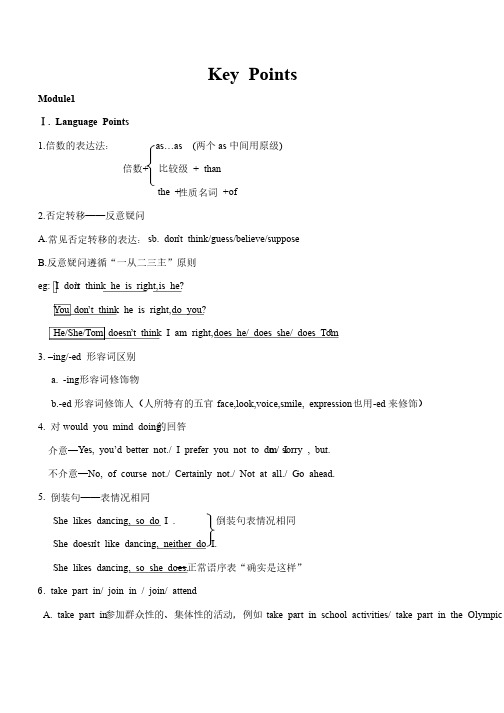
Key Points Module1 Ⅰ. Language Points 1.倍数的表达法:倍数的表达法: as as……as (两个as 中间用原级) 倍数+ 比较级比较级 + than the +性质名词性质名词 +of 2.否定转移——反意疑问否定转移——反意疑问A.常见否定转移的表达:sb. don ’t think/guess/believe/suppose B.反意疑问遵循“一从二三主”原则反意疑问遵循“一从二三主”原则eg: I don ’t think he is right, is he? You don You don’’t think he is right, do you? He/She/Tom doesn He/She/Tom doesn’’t think I am right, does he/ does she/ does Tom ?3. –ing/-ed 形容词区别形容词区别a. -ing 形容词修饰物形容词修饰物b.-ed 形容词修饰人(人所特有的五官face,look,voice,smile, expression 也用-ed 来修饰)来修饰)4. 对would you mind doing 的回答的回答的回答 介意—Yes, you’d Yes, you’d better not./ I prefer you not to do./ I better not./ I prefer you not to do./ I ’m sorry , but … 不介意—No, of course not./ Certainly not./ Not at all./ Go ahead. 5. 倒装句——表情况相同倒装句——表情况相同She likes dancing, so do I . 倒装句表情况相同倒装句表情况相同She doesn’t like dancing, neither do I. She likes dancing, so she does.—正常语序表“确实是这样”—正常语序表“确实是这样”6.6.take part in/ join in / join/ attend A. take part in 参加群众性的、集体性的活动,例如take part in school activities/ take part in the Olympic Games B. join in 参加正在进行的竞赛活动参加正在进行的竞赛活动 常用join sb. (in) doing 参加正在进行的竞赛活动C. join 参加某个组织或团体,例如,join the Party(共产党) / join the league(共青团)/ join the army(参军) D. attend正式用语,常指参加婚葬,会议,典礼,上学,上课等,例如,attend the wedding(婚礼) attend 常指参加婚葬,会议,the funeral(葬礼) attend class(上课) attend school(上学) 7. matter的用法的用法It doesn’t matter if…如果…没关系没关系Does it matter if…如果…有关系吗?有关系吗?It matters a lot if…如果…很要紧很要紧Ⅱ. Key Phrasesat the start/ beginning of 在…的开始/开端的末尾开端 at the end of 在…的末尾attitude to/towards 对…的态度换句话说的态度 in other words换句话说take part in/ join/ join sb. (in) doing/ attend 参加参加divide sth. into = sth. be divided into 划分为把…划分为move to 搬到…look forward to doing 期盼做某事期盼做某事feel/get/be bored with 对…感到厌倦感到厌倦be impressed with 某人对某人对…印象深刻印象深刻…给某人留下深刻印象/…给某人留下难leave a deep impression on/ leave an unforgettable impression on 忘的印象忘的印象用这种方式:in this way in this manner with this method by this means ——————一般现在时Ⅲ. Grammar——————一般现在时1.经常性、习惯性动作用一般现在时经常性、习惯性动作用一般现在时She goes to see the film once a week. He always/often/usually/sometimes/never/seldom talks with others. The teacher said that the earth travels around the sun. The light travels faster than sound. I will go to Xi’an if it doesn’t rain tomorrow. t talk with your mouth full. The room is bright with all the lights on. Ms. Liu comes into classroom with a book in her hand. The mother left, with the baby crying. b. 被动——done He is sleeping with the window closed. c. 还没做还没做With so much homework to do, I can’t go out. that……﹠so that 2. so…thatthat……如此…以致于…A. so…thatShe explains English grammar so clear that even I can understand it. B. so that 引导结果状语从句,译为“因此”引导结果状语从句,译为“因此”引导结果状语从句,译为“因此”’t feel completely stupid. Mrs. Liu just smiles, so that you don3.appreciate 的用法的用法A. appreciate (one’s) doing 感激(某人)做某事感激(某人)做某事I appreciate your helping me. …如果…我将感激不尽B. I would appreciate it if我将感激不尽I would appreciate it if you help me. 4. admit 的用法的用法A. admit doing 承认做了某事承认做了某事承认做了某事He admitted breaking the window. B. sb. be admitted to/into 被…录取或接收录取或接收I was admitted to/into Peking University. 5. prefer 的用法的用法 (preferring, preferred) A. prefer sth. 更喜欢更喜欢…—Which one do you prefer, the apple or the pear? —I prefer apple. B. prefer sth to sth. 比起…更喜欢…Rather than talk with us, he prefers to play alone. admit/appreciate/avoid/consider/mind/look forward to/be busy/be good at +doing sb. need to do 某人必须做某事 sth. need doing such little children/ such great progress(such little:这么小) so little+不可数名词不可数名词 “如此少”eg: do you think/believe/guess/suppose, 插入语最大的特点是后接陈述句插入语最大的特点是后接陈述句 Who do you think you are? What do you guess she likes? When do you suppose we should set off(出发)?Where do you think we can go? 划线处都应为陈述句划线处都应为陈述句eg: The dog approached the garden when the girl ran out. China is larger than other countries.(population are peasants.(4. afford 的用法的用法sth. can/can can/can’’t/be able to/ be not able to afford 意为“能够/不能支付得起”不能支付得起”to do sth. eg: I can afford this coat. = I can afford to buy this coat. 5. “许多大,大量的”“许多大,大量的”A. + 可数名词复数:可数名词复数: many a good/ great many a large/ great number of 谓语动词用复数谓语动词用复数There are a great many books in our school ’s library. A number of teachers in our school are men. B. + 不可数名词:much a great deal of a large amount of 谓语动词用单数谓语动词用单数A great deal of water in our city is wasted every year. A large amount of money was lost. C. + 两可:a lot of=lots of plenty of (这两个短语作主语时谓语动词形式依据名词是否可数来确定) a large quantity of (作主语,谓语动词用单数) large quantities of (作主语,谓语动词用复) A lot of students in this school have passed the exam.(后接了可数名词复数,所以谓语动词用复数) Lots of food is eaten by the guests.(客人) (后接了不可数名词,所以谓语动词用单数)A large quantity of milk is wasted. (a large quantity of 作主语,谓语动词用单数) Large quantities of milk are wasted. (large quantities of 作主语,谓语动词用复数) 6. 多个形容词作主语时的顺序多个形容词作主语时的顺序 :“限冠形龄颜国材”“限冠形龄颜国材”Ten strong young Chinese students are taking part in the boat race. 7. 半系动词:包括5个感官动词(look, sound, smell, taste, feel); remain; keep 最大特点:后接形容词,The 100-year-old architecture still remains new. eg: It is the first time that I have visited China. eg: It was the first time that I had visited China. 从句,从句通常用一般过去式从句,从句通常用一般过去式eg: It is six years since we saw each other last year. I have been to France twice. (make/ earn money by doing sth. 等一会儿例如 wait for a while 等一会儿挣钱 such as 例如靠…挣钱feel fortunate doing sth. 做某事感到很幸运做某事感到很幸运 remain to be done 尚待,有待为生尚待,有待 live on 以…为生so far / up to now/ till now 到目前为止(完成时态标志词除了这三个还有:since, already, yet, never) 。
外研版高一英语必修一module1module2module3知识点整理课件

3. admit vt. 允许进入,接收某人(入学/入院) 承认
admit sb. /sth. into/to …允许进入 = be admitted into/to … 被…接收
admit doing sth. 承认做某事
4. as a result 因此 = as a consequence as a result of 由于= as a consequence of
the inssttrruucctitoinosn of the guide while trtraavvelllliendg.
Guide: You are welcome to take part _i_n_the activity held by our museum. Our museum is nothing like t_h_a_tin other
活学活用⑵The New Century Global Center, situated in Chengdu,
is roughly 20 times the size of Sydney Opera.
12. that 同名不同物(指代可数名词单数或不可数名词) those 同名不同物(指代可数名词复数)
活学活用:⑵Last year, I was invited to go to Alaska to attend a gathering of former neighbors.
⑶So far many people have joined the club.
11. 倍数表达法 倍数 + as adj./adv. as 形容词和副词的比较级+ than the size/ length/ width/ height/ depth of
外研社必修1-整体6个module复习总结(可编辑修改word版)

Module 1 My First Day at Senior High 单元复习导航Module 2My New Teachers 单元复习导航Module 3My First Ride on a Train 单元复习导航Module 4A Social Survey—My Neighborhood单元复习导航Module 5A Lesson in a Lab 单元复习导航Module 6The Internet and Telecommunications单元复习导航重点词汇汉译英1.包含;包括;容纳vt.2.接近;通道;进入(权)n.3.来源;出处n.4.保护;防卫;防御n.5.创造;发明;创作vt.6.设计;图案vt. & n.7.文件;公文n.8.许可;准许n.9.专心于;集中(注意力等)vi.10.明确的;确定的adj.11.独立的;自主的adj.12.时常;经常adv.13.弊端;缺点n.14.平均的;平常的;平均数adj.& n.英译汉15.keyword n.16.software n.17.accessible adj.18.data n.19.via prep.20.percentage n.itary adj.22.fantastic adj.23.essay n.24.statistics n.词汇拓展1.contain vt. n.容器2.defence n. v.保卫;保护3.create vt. n.创作者;创造者n.创造;创造物adj.有创造性的4.percentage n. n.百分之……5.permission n. vt.允许,许可6.invention n. n.发明家;发明者vt.发明;创造7.i ndependent adj. n. 独立;自立adj.依赖的;取决于……的n.依靠;信赖vt.& vi.依靠;依赖;取决于8.d isadvantage n. n.优势;优点9.concentrate v. n.专心;专注;集中10.fantastic adj. n.幻想;想象11.frequently adv. adj.频繁的n.频率;发生率重点词组1.由……组成of/be of2.一系列;一套a3.下降4.作为……而出名;被称为……become5.集中精力;聚精会神6.也as7.想出;提出come8.从那时起from that9.把某物包起来wrap sth.10.与……相比重点句型1.It millions of pages of data.它包含数以百万计页面的数据。
外研社高中英语必修一Module1-6所有重点归纳

Module 1 My First Day at Senior High1 How’s it going? = How is everything recently?2 cover:包含,包括●be covered with 被……覆盖3 at the end of …在……结束的时候Eg : Class 5 is at the end of the corridor.●in the end = at last 最后,终于(一般时态)Eg: I am sure I will win in the end.●by the end of …到……为止(后用完成时态)Eg :①By the end of this term, we will have learnt two English books.②By the end of last year, we had finished our task.●end up with 以……告终4 receive 客观上收到; accept 主观上收到Eg :I received his invitation but did not accept it.5 divide:划分,把整体分为若干部分Eg :The world is divide into five continents.※比较separate:分隔,把原来连在一起或靠近的分隔开来6 表参加活动的短语:take part in + 活动join the party join in the game attend + the meeting7. The teachers are very enthusiastic and friendly and the classrooms are amazing.表示“吃惊”的几个单词:◆surprise指“由于出乎意料而感到惊异或诧异”。
Eg: His coming surprised me.◆astonish指“由于出乎意料而又不能理解而感到吃惊”,语意较强。
外研版英语必修一知识点归纳
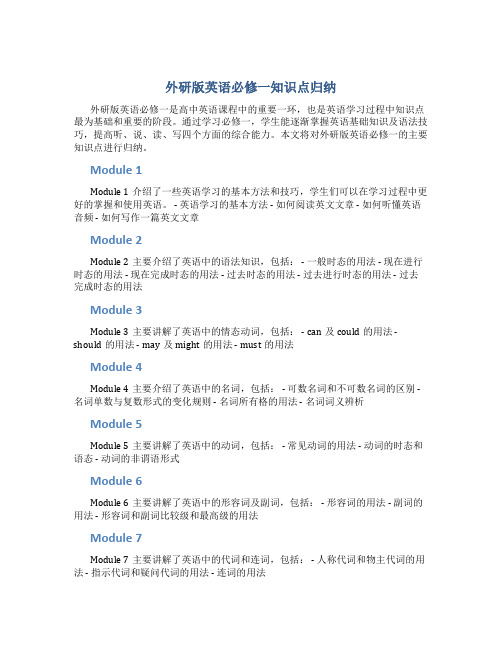
外研版英语必修一知识点归纳外研版英语必修一是高中英语课程中的重要一环,也是英语学习过程中知识点最为基础和重要的阶段。
通过学习必修一,学生能逐渐掌握英语基础知识及语法技巧,提高听、说、读、写四个方面的综合能力。
本文将对外研版英语必修一的主要知识点进行归纳。
Module 1Module 1介绍了一些英语学习的基本方法和技巧,学生们可以在学习过程中更好的掌握和使用英语。
- 英语学习的基本方法 - 如何阅读英文文章 - 如何听懂英语音频 - 如何写作一篇英文文章Module 2Module 2主要介绍了英语中的语法知识,包括: - 一般时态的用法 - 现在进行时态的用法 - 现在完成时态的用法 - 过去时态的用法 - 过去进行时态的用法 - 过去完成时态的用法Module 3Module 3主要讲解了英语中的情态动词,包括: - can及could的用法 - should的用法 - may及might的用法 - must的用法Module 4Module 4主要介绍了英语中的名词,包括: - 可数名词和不可数名词的区别 - 名词单数与复数形式的变化规则 - 名词所有格的用法 - 名词词义辨析Module 5Module 5主要讲解了英语中的动词,包括: - 常见动词的用法 - 动词的时态和语态 - 动词的非谓语形式Module 6Module 6主要讲解了英语中的形容词及副词,包括: - 形容词的用法 - 副词的用法 - 形容词和副词比较级和最高级的用法Module 7Module 7主要讲解了英语中的代词和连词,包括: - 人称代词和物主代词的用法 - 指示代词和疑问代词的用法 - 连词的用法Module 8Module 8主要讲解了英语中的句型结构,包括: - 简单句的构成和用法 - 并列句的构成和用法 - 复合句的构成和用法Module 9Module 9主要讲解了英语中的语音知识,包括: - 元音和辅音的发音规则和区别 - 重音的位置及其构成,掌握了外研版英语必修一的主要知识点,能够为学生顺利学习英语打下坚实的基础。
高中外研版必修一Module1重点单词
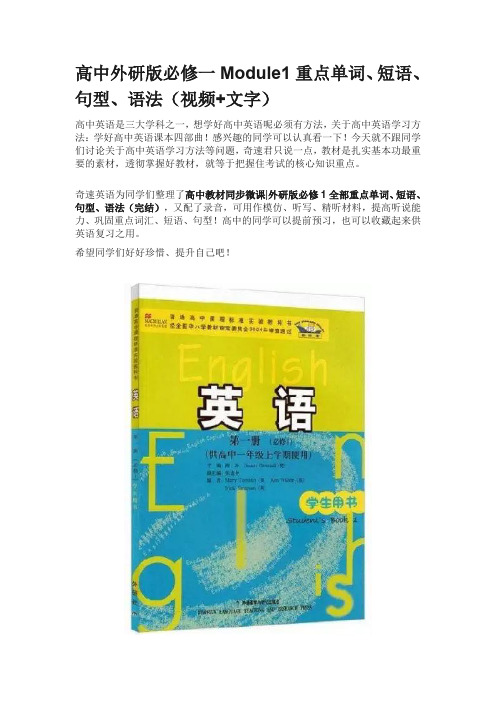
高中外研版必修一Module1重点单词、短语、句型、语法(视频+文字)高中英语是三大学科之一,想学好高中英语呢必须有方法,关于高中英语学习方法:学好高中英语课本四部曲!感兴趣的同学可以认真看一下!今天就不跟同学们讨论关于高中英语学习方法等问题,奇速君只说一点,教材是扎实基本功最重要的素材,透彻掌握好教材,就等于把握住考试的核心知识重点。
奇速英语为同学们整理了高中教材同步微课|外研版必修1全部重点单词、短语、句型、语法(完结),又配了录音,可用作模仿、听写、精听材料,提高听说能力、巩固重点词汇、短语、句型!高中的同学可以提前预习,也可以收藏起来供英语复习之用。
希望同学们好好珍惜、提升自己吧!高中外研版必修一Module1Module2Module3Module4Module5Module6外研版必修一Module1重点单词academic [ækə'demik] adj. 学术的province ['prɒvins] n. 省enthusiastic [in,θju:zi'æstik] adj.热心的amazing [ə'meiziŋ] adj.令人吃惊的,令人惊讶的information [infə'meiʃən] n. 消息;website [ web'sait] n.网站;网址brilliant ['briljənt] adj.(口语)极好的comprehension [ˌkɒmpri'henʃən] n. 理解,领悟instruction [in'strʌkʃən] n.(常作复数)指示;说明method ['meθəd] n. 方法bored ['bɒ: d] adj.厌烦的;厌倦的embarrassed [im'bærəst] adj.尴尬的;难堪的;困窘的attitude ['ætitju:d] n. 态度behaviour [bi'heivjə] n. 行为;举动previous ['pri:viəs] adj.以前的;从前的deion [di'skripʃən] n.记述;描述amazed [ə'meizd] adj. 吃惊的;惊讶的embarrassing [im'bærəsiŋ] adj.令人尴尬的;令人难堪的technology [tek'nɒlədʒi] n. 技术impress [im'pres] vt.使印象深刻correction [kə'rekʃən] n. 改正;纠正encouragement [in'kʌridʒmənt] n. 鼓励;激励enjoyment [in'dʒɒimənt] n.享受;乐趣fluency ['flu:ənsi] n.流利;流畅misunderstanding [ˌmisʌndə'stændiŋ] n. 误解disappointed [ˌdisə'pɒintid] adj. 失望的disappointing [ˌdisə'pɒintiŋ] adj.令人失望的system ['sistəm] n. 制度;体系;系统teenager ['ti:nidʒə] n. 少年disappear [ˌdisə'piə] vi. 消失move [mu:v] v.搬家assistant [ə'sistənt] n. 助手,助理cover ['kʌvə] vt.包含diploma [di'pləumə] n. 文凭;毕业证书外研版必修一Module1重点短语1. in other words 换句话说2. look forward to 期待;盼望3. at the start of 在……开始的时候4. at the end of 在……结束的时候5. go to college 上大学6. be divided into 被(划)分成……7. take part in 参加8. differences between A and B A与B的不同之处9. be similar to…in ... 与……在……方面相似10. the attitude to/towards… 对待……的态度11. a city not far fr om … 一个离……不远的城市12. write down… 记下,写下13. on the computer 在电脑上14. on the screen 在屏幕上15. information from websites 网站上的信息16. a woman called…. 一个叫……的妇女17. be nothing like 一点都不像18. speak a lot in class在课堂上讲太多19. have fun 玩得开心20. introduce oneself自我介绍21. in groups 按组进行22. give sb instructions给某人指示23. work by oneself 靠某人自己工作24. improve one’s spelling 提高某人的拼写能力25. in a fun way 以一种愉快的方式26. in other words 换句话说27. for one’s homework 为某人的家庭作业28. a deion of ……的描述29. look forward to doing… 盼望做……30. make a good impression on sb给某人留下好印象31. A is the same size as B A与B一样大32. the number of ……的数量33. be fluent in Chinese 汉语流利34. speak Chinese with fluency 汉语讲得流利35. make a lot of/much progress 取得很大进步36. write to sb写信给某人37. all over the world全世界38. the smell of… ……的味道39. move to…. 搬迁到……40. have the biggest smile 拥有最开心的笑容41. the American school systems 美国教育体系42. cover 7 years 有七年时间43. receive the high school diploma 获得高中文凭44. September through December 9月到12月45. be free to do 自由做……46. after-school activities课外活动外研版必修一Module1重点句型1. We’re so much looking forward to seeing you again.我们非常渴望再见到你。
外研版高一英语必修一Module1~6知识点总结讲解学习

外研版高一英语必修一M o d u l e1~6知识点总结Book 1 Module 11 be similar to2 sb’s attitude to/towards…3 far from4 a computer with a special screen5 a enthusiastic woman call ed Ms Shen6 sb’s method of teaching=sb’s teaching method7 nothing like 8 reading comprehension9 have fun10 feel bored=be bored11 introduce…to…12 in groups13 give…instructions on…14 by oneself=on one’s own15 improve sb’s spelling and handwriting16 in a fun way精品资料17 in other word s18 write a description of=describe19 look forward to doing20 be impressed with21 make (much) progress22 Would you mind do ing?23 at the start/beginning of…24 at the end of…25 receive the high school diploma26 go to college 27 divide… into…28 be divided into…29 take part in all kinds of activities30 summer vacation31 I live in Shijazhuang, a city notfar from Bejing。
32 Every has a computer with aspecial screen, almost as big asa cinema screen..精品资料33 Ms Shen’ teaching method isnothing like that of theteachers at my Junior Highschool.34 I don’t think I will be bored inMs Shen’s class.35 In other words, there are threetimes as many girls as boys.36 For our homework tonight, wehave to write a description ofthe street where we live.37 Some students wereembarrassed at first, buteveryone was friendly and itwas really very nice.38 Ms shen gave us instructionsand then we worked byourselves.精品资料39 How are you doing?40 How is it going?41 Secondary school in the Ususually cover s seven years,grades six to twelve.42 The school year is divided intotwo semesters, the first of which is September throughDecember, and the secondJanuary through May. 43 The amazing news amazed us.44 The disappointing news madeus disappointed.45 His disappointed expressionsuggested(that) he wasdisappointed.46 join (us) in the game47 join an organization加入一个组织48 join the party精品资料49 attend the wedding 参加婚礼50 attend the opening ceremony参加开幕式51 This bridge is three times aslong as that one.52 This bridge is twice longer thanthat one.53 This bridge is three time thelength of that one. 54 There is three times as muchmoney in my pocket as in yours.55 The climate of Bejing is quitedifferent from that of Qingdao.56 There is nothing like a holidayto make one happy.Book 1 Module 11 和…相似2 对于…的态度3 远离;远不是远非精品资料4 一个带有特殊屏幕的电脑5 一个被叫做沈女士的热心肠的妇女6 sb的教学方法7 一点也不像8 阅读理解9 玩地快乐10 感到厌倦11把…介绍给…12 成组地,按组的13给…关于…的指示14 通过…自己15 改善…的拼写和书法16 通过一种有趣的方式17 换句话说18 描述19 盼望做20 对…印象深刻21 取得(许多)进步22 你介意做…?23 在…开始精品资料24 在…末尾25 得到高中文凭26 去上大学27把…分成…(整体分成部分)28 被分成…29 参加多种多样的活动30 暑假31 我住在石家庄,一个离北京不远的城市32 每个教室都有一台电脑,带有几乎像电影屏幕一样大的特殊屏幕33 沈女士的教学方法一点也不像我初中教师的教学方法。
外研版高一英语必修一Module1~6知识点总结.doc

Book 1 Module 1 13 give⋯instructions on ⋯1 be similar to 14 by oneself=on one ’s own2 sb’s attitude to/towards ⋯15 improve sb’s spelling and3 far from handwriting4 a computer with a special screen 16 in a fun way5 a enthusiastic woman call e d Ms 17 in other word sShen 18 write a description of=describe 6 sb’s method of teaching=sb ’s19 look forward to doingteaching method 20 be impressed with7 nothing like 21 make (much) progress8 reading comprehension 22 Would you mind do ing ?9 have fun 23 at the start/beginning of ⋯10 feel bored=be bored 24 at the end of ⋯11 introduce ⋯to ⋯25 receive the high school diploma12 in groups 26 go to college27 divide ⋯into ⋯35 In other words, there are three28 be divided into ⋯times as many girls as boys.29 take part in all kinds of activities 36 For our homework tonight, we30 summer vacation have to write a description of31 I live in Shijazhuang, a city not far the street where we live.from Bejing 。
高中英语词汇精讲外研版book 1 module 1 1-3

eg. Read the instructions first before you take this kind of medicine. (instructions=directions) ) ①[follow/carry out] sb's instructions②give instructions to sb. ② ③under one's instruction④on one's instructions ④ (4)形容词化:instructive eg. His lesson is very instructive )形容词化: (5)名词化:instructor 指导者 )名词化: 4. [辨析 辨析]nothing like, something like 辨析 (1)nothing like ①=better than anything else ) eg. On an especially hot day, there's nothing like a cold drink that can make me refreshed. ②=it doesn't like… at all = be totally different from… eg. This is nothing like what I want. (2)something like 像……一样的东西 ) 一样的东西 eg. I need a tool something like a spade or a stick. (3)nothing but 正是 ) eg. He is nothing but an expert in English. 他正是英语专家。 他正是英语专家。 (4)anything but = not at all 根本不是 ) eg. He is anything but an engineer. 他根本不是专家。 他根本不是专家。
- 1、下载文档前请自行甄别文档内容的完整性,平台不提供额外的编辑、内容补充、找答案等附加服务。
- 2、"仅部分预览"的文档,不可在线预览部分如存在完整性等问题,可反馈申请退款(可完整预览的文档不适用该条件!)。
- 3、如文档侵犯您的权益,请联系客服反馈,我们会尽快为您处理(人工客服工作时间:9:00-18:30)。
Key PointsModule1Ⅰ. Language Points1.倍数的表达法:as…as (两个as中间用原级)倍数+ 比较级+ thanthe +性质名词+of2.否定转移——反意疑问A.常见否定转移的表达:sb. don’t think/guess/believe/supposeB.反意疑问遵循“一从二三主”原则’t think he is right, is he?do you?does he/ does she/ does Tom?3. –ing/-ed 形容词区别a. -ing形容词修饰物b.-ed形容词修饰人(人所特有的五官face,look,voice,smile, expression也用-ed来修饰)4. 对would you mind doing的回答介意—Yes, you’d better not./ I prefer you not to do./ I’m sorry , but…不介意—No, of course not./ Certainly not./ Not at all./ Go ahead.5. 倒装句——表情况相同倒装句表情况相同She doesn’She likes dancing, so she does.—正常语序表“确实是这样”6.take part in/ join in / join/ attendA. take part in 参加群众性的、集体性的活动,例如take part in school activities/ take part in the OlympicGamesB. join in 参加正在进行的竞赛活动常用join sb. (in) doingC. join 参加某个组织或团体,例如,join the Party(共产党) /join the league(共青团)/ join the army(参军)D. attend正式用语,常指参加婚葬,会议,典礼,上学,上课等,例如,attend the wedding(婚礼) attendthe funeral(葬礼) attend class(上课) attend school(上学)7. matter的用法It doesn’t matter if…如果…没关系Does it matter if…如果…有关系吗?It matters a lot if…如果…很要紧Ⅱ. Key Phrasesat the start/ beginning of 在…的开始/开端at the end of 在…的末尾attitude to/towards 对…的态度in other words换句话说take part in/ join/ join sb. (in) doing/ attend 参加divide sth. into = sth. be divided into 把…划分为move to 搬到…look forward to doing 期盼做某事feel/get/be bored with 对…感到厌倦be impressed with 某人对…印象深刻leave a deep impression on/ leave an unforgettable impression on …给某人留下深刻印象/…给某人留下难忘的印象用这种方式:in this way in this manner with this method by this meansⅢ. Grammar——————一般现在时1.经常性、习惯性动作用一般现在时She goes to see the film once a week.He always/often/usually/sometimes/never/seldom talks with others.2.客观规律The teacher said that the earth travels around the sun.The light travels faster than sound.3.在if引导的条件状语从句中,主句用将来时,从句用一般现在时,也就是“主将从现”I will go to Xi’an if it doesn’t rain tomorrow.主将从现Ⅳ. Everday English——How are you doing?=How is it going?某事进展的怎么样?——Fine./ Not bad.Module2Ⅰ. Language Points1.with 的用法A. with + 宾语+ adj./ adv./介词短语a. with + 宾语+ adj.Don’t talk with your mouth full.b. with + 宾语+ adv.The room is bright with all the lights on.c. with + 宾语+ 介词短语Ms. Liu comes into classroom with a book in her hand.B. with + 宾语+ V. (看宾语和动词之间的关系)a. 主动——ingThe mother left, with the baby crying.b. 被动——doneHe is sleeping with the window closed.c. 还没做With so much homework to do, I can’t go out.2. so…that…﹠so thatA. so…that…如此…以致于…She explains English grammar so clear that even I can understand it.B. so that 引导结果状语从句,译为“因此”Mrs. Liu just smiles, so that you don’t feel completely stupid.3.appreciate 的用法A. appreciate (one’s) doing 感激(某人)做某事I appreciate your helping me.B. I would appreciate it if…如果…我将感激不尽I would appreciate it if you help me.4. admit 的用法A. admit doing 承认做了某事He admitted breaking the window.B. sb. be admitted to/into 被…录取或接收I was admitted to/into Peking University.5. prefer 的用法(preferring, preferred)A. prefer sth. 更喜欢…—Which one do you prefer, the apple or the pear?—I prefer apple.B. prefer sth to sth. 比起…更喜欢…I prefer apple to banana. 比起香蕉我更喜欢苹果C.prefer doing sth. to doing sth. 比起做…更喜欢做…I prefer dancing to singing. 比起唱歌,我更喜欢跳舞D.prefer to do rather than do 宁愿…也不愿…Rather than talk with us, he prefers to play alone.6. would rather 的用法A. would rather (not) do宁愿(不)做…I would rather stay at home.B. would rather do than do 宁愿做…也不愿…I would rather stay at home than go to see the movies.Ⅱ. Key Phrasesin fact事实上fall asleep(fall的过去式是fell)睡着tell joks讲笑话(tell的过去式told) make progress取得进步(progress不可数)make a lot of/great/much progress取得巨大进步as a result结果as a result of=because of由于respectful=polite有礼貌的respectable体面的,正派的,值得尊敬的be patient with sb.对某人有耐心be popular in sp.在某地受欢迎be popular with sb.在某个人群当中受欢迎be strict with sb. in sth. 在某方面对某人要求严格admit doing承认做了某事sb. be admitted to某人被…接收或录取appreciate one’s doing感激某人做某事I would appreciate it if you….如果…我将感激不尽consider doing考虑做某事nothing like 完全不像make sb. do sth / sb. be made to do 使某人做某事prefer doing A to doing B 比起做A更喜欢做B prefer to do rather than do 宁愿做…也不愿做…would rather (not) do 宁愿(不)做…would rather do than do 宁愿做…也不愿做…have problems with sth. 在某方面有问题have problem/difficulty (in) doing 做某事有困难Ⅲ. Grammar1.非限制性定语从句A.标志: “,”将主从句隔开B.指人时,主语用who, 宾语用whomHe is a doctor, who is in his thirties.The old man has two sons, one of whom is a scientist.C.指物只能用which (在限制性定语从句中既可用which也可用that来指物)This is the house, which I lived in ten years ago.D.指地点用whereThis is the house, where I lived ten years ago.2.V. + doing/ to doA.只能接doingB.既能接doing, 又能加to do, doing表做过了,to do还没做要去做remember to do/ doing forget to do/ doing stop to do/ doing go on to do/ doing C.接doing与接to do时意义差别较大try to do 努力尽量做try doing 尝试做regret to do对将要做的事感到抱歉regret doing 后悔做了某事mean to do 打算计划做某事mean doing 意味着sb. need to do 某人必须做某事sth. need doing 某物需要…can’t help sb. to do不能帮某人做某事can’t help doing情不自禁Ⅳ. Everyday EnglishHave you got that? 你听说了吗?/你明白了吗?It’s up to you. 由你决定That’s settled.就这么定了Take/Have a look at…看一看… a couple of things 两三件事情Module 3Ⅰ. Language Points1.get on/off﹠get into/out of﹠take offget on/off 上下(bus, train, plain, ship) get into/out of 上下(taxi, car) take off: 起飞;脱掉2. so﹠suchA. so beautiful a girl/ such a beautiful girlB. such + 可数名词复数/ 不可数名词such little children/ such great progress(such little:这么小)C. so many/much/littleso many+可数名词复数“如此多”eg:so many studentsso much+不可数名词“如此多”eg: so much moneyso little+不可数名词“如此少”eg: so little food3.refer to 的多层含义(refer过去式referred)A.参考,查阅For further information, you can refer to the website of our company.B.提到,涉及When she said someone was stupid, I’m she didn’t refer to me.C.归功于He referred his success to the good education he has received.D.适用于These books refers to students under 10 years old.Ⅱ. Key Phrasesbe short for…的缩写或简称at midnight 在午夜out of date 过期的,过时的at a speed of 以…的速度the rest of 剩余的/其他的…for the first time平生第一次play with 和…玩all the time 一直,总是Ⅲ. Grammar——过去分词作后置定语﹠插入语1. 动词过去分词做后置定语: done, to be dong, being done 可以做后置定语修饰一个名词eg. The question discussed at the meeting yesterday 昨天在会上讨论的问题The question being discussed at the meeting now会议上正在讨论的问题The question to be discussed at the meeting tomorrow明天会上将被讨论的问题2. 插入语:在一个句子中间插入的一个成分,它不作句子的任何成分,可有可无。
